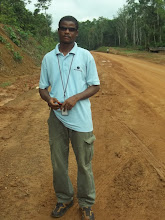Every day, in Liberia and around the world, more than 3,000 people are killed in road crashes and up to 137,000 are injured - that adds up to more than 1.3 million people dying on our roads every year. Far from abating, this tragic toll continues to increase, especially in low- and middle-income countries like Liberia, where more than 90% of road fatalities occur.
An additional tragedy is that youth are paying the highest price - worldwide, road traffic injuries are the leading cause of death among young people aged 15 to 29, and the second cause of death for those aged 5 to 14. That is unacceptable. We must work together to save these millions of lives, especially young lives.
A statement issued by the Liberia National Red Cross Society over the weekend in Monrovia said what makes these statistics particularly horrendous is that these deaths and injuries are preventable. Simple, cost-effective and proven measures can make the roads safer and change the behaviour of road users. This is why the International Federation of Red Cross and Red Crescent Societies (IFRC) are calling for urgent global action to address this major public health problem.
Governments must be persuaded to pass and enforce traffic laws to reduce speeding, to fix strict limits on drinking and driving and to make the use of seat belts and helmets mandatory. Other effective measures include the adoption of national road safety policies supported by adequate and stable financing, better road conditions, public awareness campaigns on road safety, more first aid training for new and professional drivers, and better emergency care for road crash victims.
More than one third of the IFRC’s 186 member societies including the Liberian Red Cross are actively involved in road safety activities. Many have integrated road safety in their first aid programs. Working at the heart of communities, they have effective access to people of all ages and conditions. They promote safe behavior for road users through public campaigns, they teach road safety to schoolchildren and provide first aid training, and of course, when road crashes occur, they are there, to provide vital first aid services to victims.
For their part, Red Cross and Red Crescent Youth have identified road safety as one of today’s key humanitarian challenges. In their agenda-setting Solferino Declaration in June this year, they call on the governments of the world to include first aid and road safety in national education curricula, and to allocate appropriate resources. They also commit to promote road safety and encourage their peers to act as responsible road users.
The IFRC believes that promoting a culture of prevention can minimize unnecessary deaths and ultimately build safer communities. In line with this approach, it has made safer roads a priority for action over the next ten years. As part of its commitment, it also hosts the Global Road Safety Partnership, created in 1999 to address road safety issues, principally in developing countries.
Working together with our partners - governments, civil society, UN agencies, as well as the transport, health and business sectors, we believe we can significantly mitigate the multiple and tragic social and economic consequences of road crashes.
Monday, November 16, 2009
Subscribe to:
Post Comments (Atom)

Hi Sam,
ReplyDeleteI really love this. You are doing great job. check your email. I send a very important message.
Sampson Zota Dolo
You are great Sam. I love you so much. and pray that whatever you are doing God help be successful at it.
ReplyDeleteSampson Zota Dolo